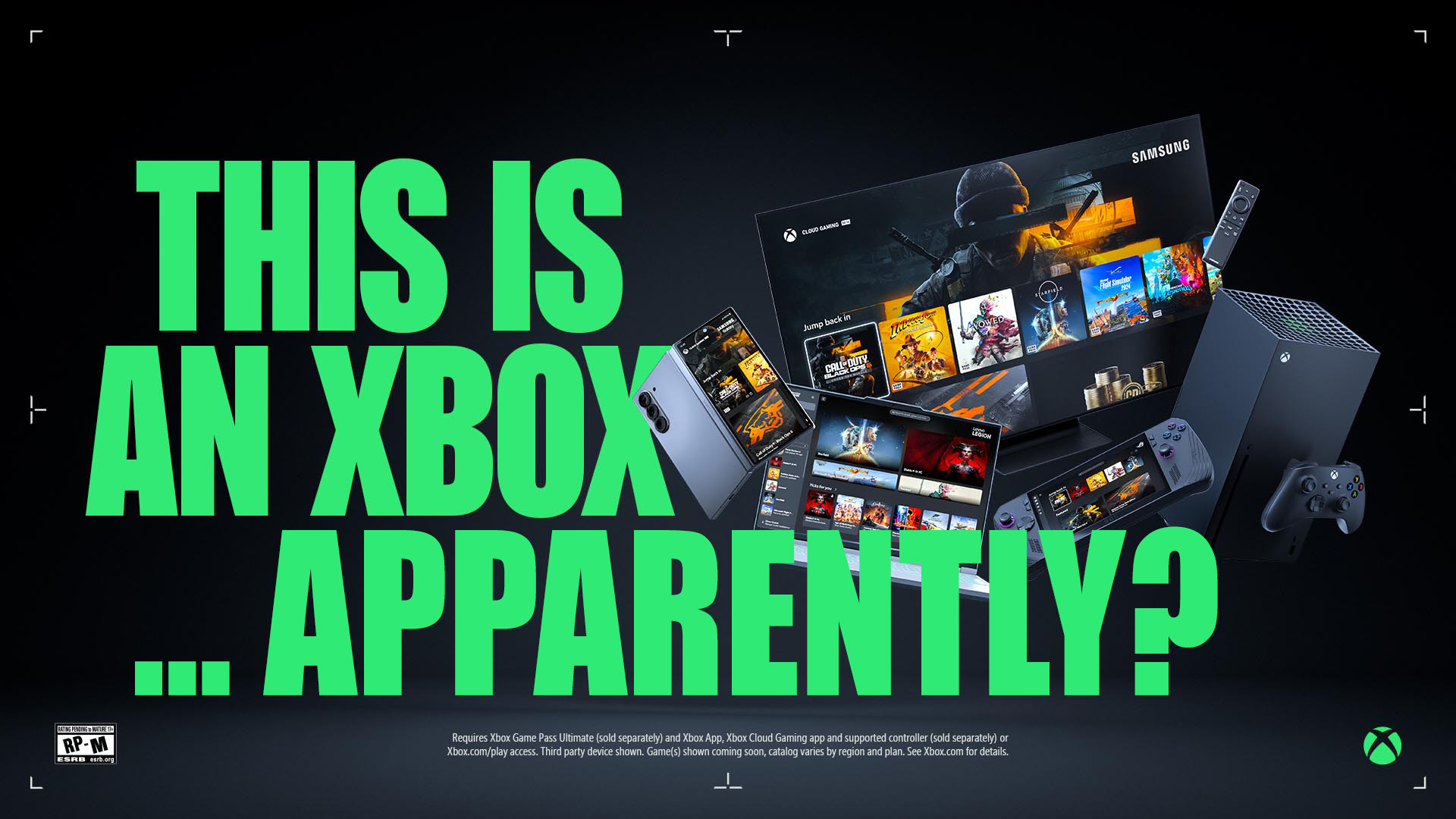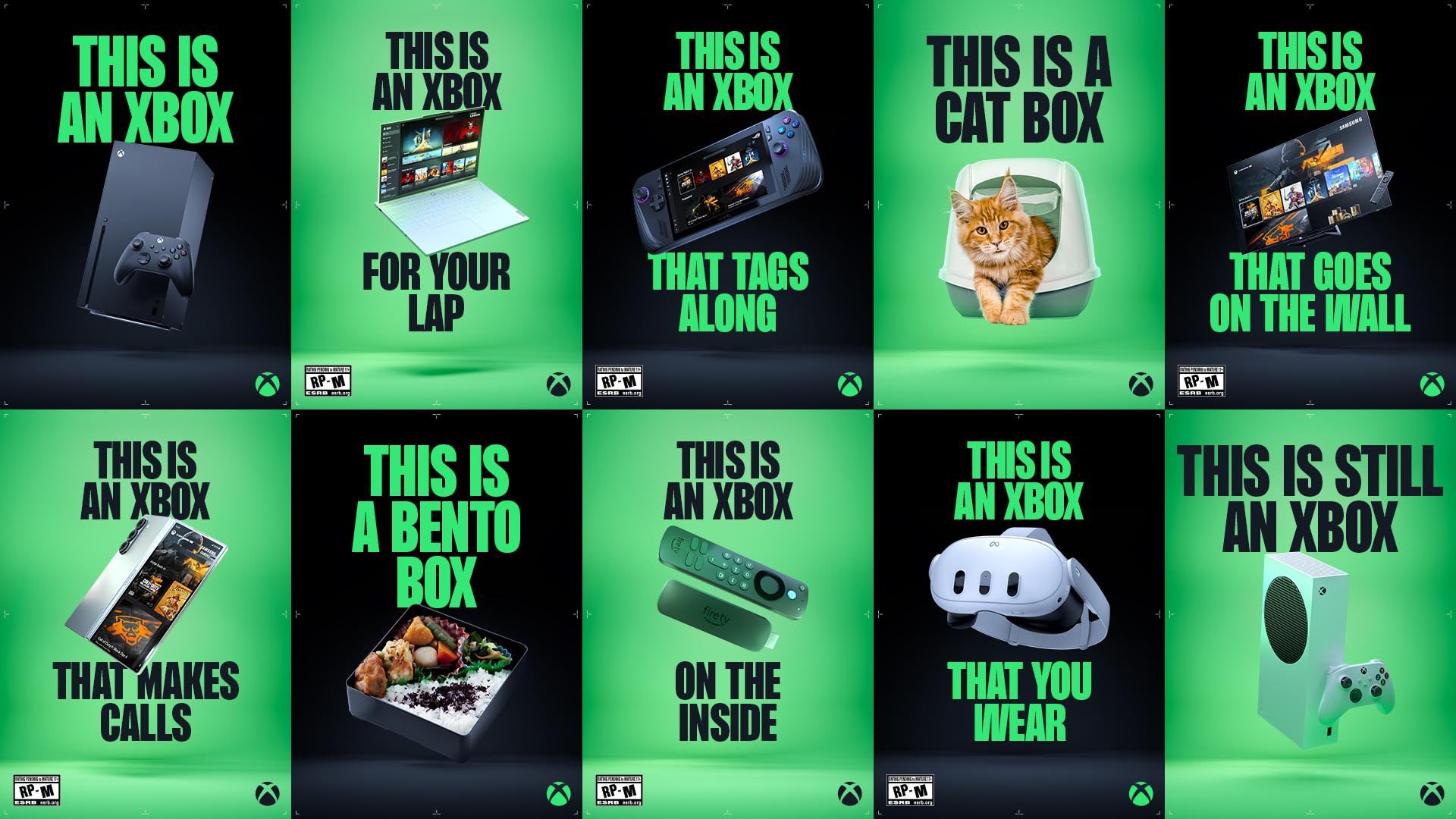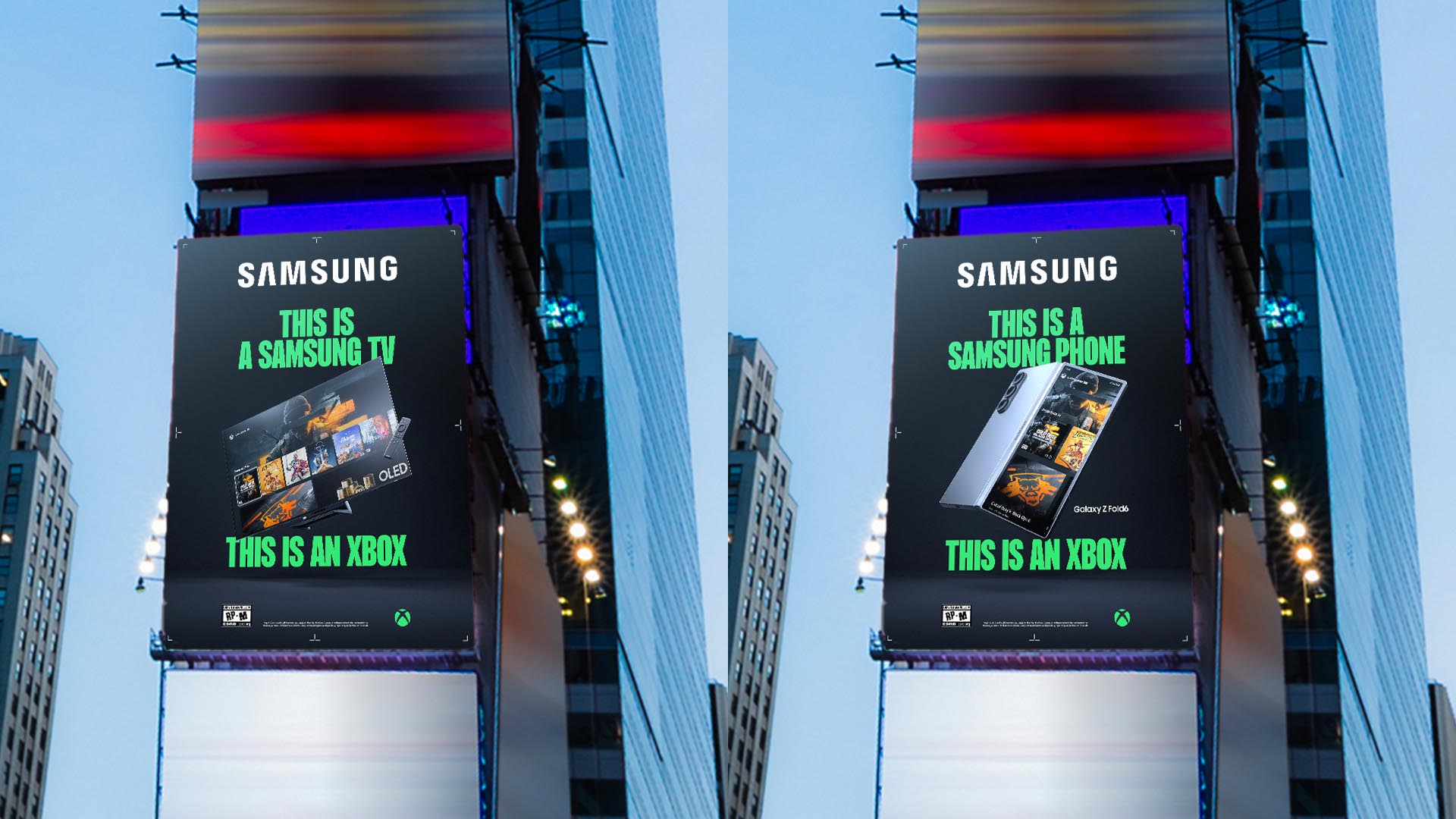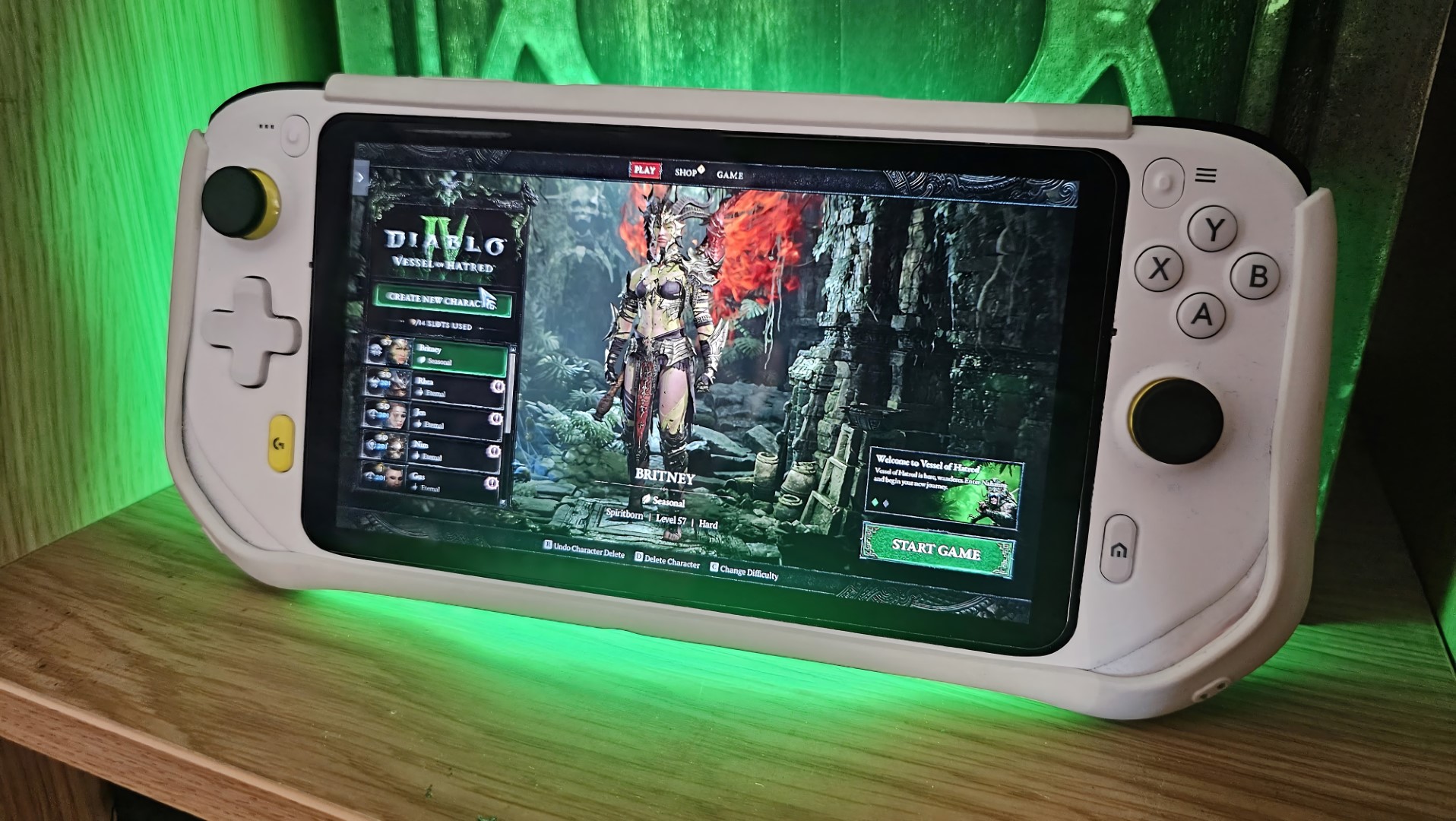
As a tech enthusiast who’s been following the gaming industry for years, I must admit that Microsoft’s recent “This is an Xbox” ad campaign has left me scratching my head a bit. Now, don’t get me wrong, I wholeheartedly agree with the vision they are trying to sell – a future where games can be accessed anywhere, anytime, and on any device. It’s a tantalizing prospect that I’ve been eagerly anticipating for quite some time.
Recently, while I took a short break from work, Microsoft launched its fresh advertising campaign for Xbox. It’s common for products to initiate new ad campaigns and unveil new marketing slogans before Christmas and Black Friday, as these periods are traditionally busy for all sorts of goods and services. Notably, Microsoft’s Xbox usually sees a surge in sales during the holiday season, which is why they’ve reduced the price of the Xbox Series X by $50 at Amazon and other stores. Additionally, items like the WD_Black Storage Card for Xbox Series X|S are also on sale, as people rush to buy gifts for their loved ones (and perhaps a little something extra for themselves).
Currently, the Xbox Series X with a disc drive, available on Amazon US, is out of stock. This implies that Microsoft is managing to sell consoles nearly as quickly as they can produce them. In fact, I penned an editorial last week discussing Microsoft’s strong Xbox momentum as we approach the end of 2024.
Considering the occasional scarcity of stocks, Microsoft’s new advertising strategy might appear logical at first glance, as they are suggesting that one doesn’t necessarily need an Xbox console to play Xbox games. However, I believe this latest marketing push, dubbed “This is an Xbox,” could potentially harm the brand more than help it in its current state. It seems to echo past marketing errors by promoting a future vision over the existing product reality, and it weakens the fact that as we speak, Xbox consoles are the only genuine “Xbox” devices available.
Why is Xbox once again marketing the future rather than the present?

I’ve seen the discourse online about this ad campaign, but even before hearing from others, I immediately found myself perplexed. I am among the few people out there who actively uses the Xbox ecosystem as Microsoft is envisioning it here, and I do love the vision. I love the fact I can take my Hollow Knight or Death Stranding save from my Xbox Series X to my Lenovo Legion Go via my cloud saves (for free, unlike some other platforms). I love that there are dozens of games that support cross-buy and cross-progression via Xbox Play Anywhere. I love that there are some games I can even play with touch controls via Xbox Cloud Gaming, like Vampire Survivors, which play well via a small screen.
The issue is that it’s so, so piecemeal. It’s SO early days, and very much what I would describe as an “Early Adopter” experience. Microsoft itself even knows this, which is why Xbox.com/play cloud gaming is emblazoned with the “beta” tag still after several years. How many people are actually going to go through the trouble of pinning a website to their home screen, for a service that isn’t available to download directly from iOS or Google Play anyway? I’ve also written only recently about how the Xbox app experience on Windows PC is still sub-par. Why Microsoft thinks it’s ready for a big-budget global marketing campaign blitz strikes me as odd as someone who is actively using it.
“The billboard suggests this device is a portable version of the popular Xbox gaming console, but it appears to be a laptop instead.
DEAL: WD_Black Xbox Series X|S Storage (-37% OFF) @ Amazon US
It’s unclear what experience Microsoft intends to convey with this advertisement, as there are no traditional controllers, mice, or video games visible, only the Xbox app. This app is likely unfamiliar to most viewers. The question arises: what game can one reasonably play from their lap on the Xbox app? Is running Halo Infinite ranked matches with a trackpad the expectation here? Additionally, the ad fails to mention that the Xbox app runs poorly and has only a limited number of games that support Xbox Play Anywhere, which offers cross-progression within the Xbox ecosystem.
In the current reality, it would be unrealistic for a Samsung Galaxy Fold to function as an Xbox. The timeline where that might occur is not the one I’m experiencing.
This is just one example in a variety of caveats that come with advertising things like the Xbox cloud-baked Amazon Fire Stick, occasionally-Xbox ASUS ROG Ally, and other devices as “true” Xbox consoles. Some of them have Xbox features, but much like the mistakes of the Xbox One launch, Microsoft is leading with a vision of Xbox that is subpar over what is already there.
To me, advertising a Samsung Galaxy Fold alongside an Xbox Series X seems illogical because one costs thousands and doesn’t have controllers suitable for the Xbox cloud gaming experience. Instead, you need a full-size Xbox controller, and a separate Samsung Galaxy Fold kickstand cover to realistically play anything on an Xbox via the Galaxy Fold. Moreover, Microsoft has minimized the number of games available on its Xbox Cloud Gaming platform with custom touch controls, as the team in charge of this feature was let go during Microsoft’s budget cuts this year. If Microsoft is referring to native mobile games with Xbox integration for features like achievements or online status, there aren’t many that actually offer this functionality.
In the world I inhabit now, a Samsung Galaxy Fold isn’t an Xbox – at least not yet. That kind of transformation seems like it belongs to a different reality.
Here’s another instance showing the complications when a generic statement like “This is an Xbox” is applied to any device operating on Android, specifically today.
Why is Microsoft confusing people into not buying an Xbox in the run up to Christmas?

Previously mentioned, the Xbox Series X was unavailable at the time of writing this article; however, fresh supplies might arrive soon. This situation, though, points to a larger issue not just for Xbox, but the entire gaming industry. The number of console users remains stable, and there are indications it could be decreasing.
According to experts like Newzoo and PlayStation’s financial reports, it appears that the number of consoles sold globally historically reaches a peak at around 300 million. The reason for this is that free-to-play games, which are available on multiple platforms, are taking away players who enjoy a variety of games, a group that traditionally fuels the PlayStation and Xbox markets. To find new sources of growth, platform owners like Sony and Microsoft must identify where future growth will come from. In my opinion, Microsoft’s overall strategy is sound – instead of trying to convert people into console gamers, they should meet players where they already are. However, some might argue that the execution has been lacking.
It appears that Microsoft’s planned mobile version of their Xbox game store for Android and iOS has been postponed, and I personally believe it may never actually be released. The “purchase-to-own” library for Xbox Cloud Gaming is expected to debut this month, although it was initially announced quite some time ago – with the expectation that it will only offer a portion of the Xbox game library, not the entire collection.

As a devoted fan, it’s hard not to ponder the reasoning behind Microsoft marketing devices that offer a few Xbox-like functionalities in a fragmented way. If my initial encounter with the Xbox universe was through the Xbox app on PC, filled with its quirks, I might not feel too enticed to continue within this ecosystem. If I dabbled in Xbox cloud gaming on my smartphone and found that only a minimal selection of games are touch-compatible, I likely wouldn’t stick around for long. Truth be told, it becomes challenging for me to articulate a convincing response when someone inquisitively asks me, “What makes my phone an Xbox?
I’m pondering if there was a misalignment between this ongoing campaign and the features that were initially scheduled but delayed. The anticipated release of the Xbox game store for Android and iOS was slated for this quarter, yet it appears it won’t happen as planned. On the other hand, the Xbox buy-to-own cloud games, which were supposed to debut this month, seem to be progressing according to schedule based on our latest updates.
As I mentioned before, the vision for this platform is truly impressive. This vision is what keeps me invested in the Xbox ecosystem, despite some flaws and confusion over the last few years. However, it seems odd to promote a vision that isn’t yet complete. It also seems unnecessary to criticize the premium Xbox experience that is available today. The truth is, you can only find a genuine, top-tier Xbox experience on the Xbox Series X|S.
Actually, today, only Xbox is an Xbox
Microsoft’s “This is Xbox” ad campaign appears strong on concept. It highlights where Xbox is headed and gives a glimpse into the future of gaming in general. Microsoft seems to have a knack for forecasting the future; even though the digital-first experience of the Xbox One, introduced in 2013, was initially turned down by users, ten years later, there’s a growing preference for all-digital platforms.
As an analyst, I find myself in a position where I can’t dictate personal preferences or desires to others, as was painfully evident during the 2013 launch of the Xbox One. The lesson learned from this experience is that marketing strategies should not be built on promises or visions of future possibilities.
Microsoft’s “This is an Xbox” advertising campaign appears quite promising on a conceptual level. However, it seems incredibly inopportune to be putting forth such a statement at this particular moment in time.
Although the components are set up correctly and the systems function smoothly, most Xbox games aren’t offered on cloud gaming. The majority of developers choose not to participate in Xbox Play Anywhere that links PC and Xbox, and most PC developers refuse to support the Microsoft Store ecosystem without a Game Pass integration. This promotional effort focuses more on the underlying infrastructure rather than the primary motivation for playing games – the content itself, which remains a significant area of weakness for Microsoft within its ecosystem.
“I find Microsoft’s ‘This is an Xbox’ ad campaign quite intriguing, but I’m not a marketing expert. If this campaign turns out to be successful and helps Xbox attract new users as intended, I’ll admit I was wrong. However, it seems to me that in November 2024, asserting that everyday devices such as phones, laptops, and smart TVs can truly embody the Xbox experience might not be accurate. It appears inappropriate to familiarize the general public with Xbox through their phone, Fire Stick, or Samsung Smart Fridge at this moment. Moreover, it could potentially weaken the impact of the traditional Xbox Series X and Xbox Series S console, considering users’ concerns about Microsoft’s long-term commitment to Xbox hardware.
Read More
- Gold Rate Forecast
- PI PREDICTION. PI cryptocurrency
- Mission: Impossible 8 Reveals Shocking Truth But Leaves Fans with Unanswered Questions!
- SteelSeries reveals new Arctis Nova 3 Wireless headset series for Xbox, PlayStation, Nintendo Switch, and PC
- Masters Toronto 2025: Everything You Need to Know
- Eddie Murphy Reveals the Role That Defines His Hollywood Career
- LPT PREDICTION. LPT cryptocurrency
- WCT PREDICTION. WCT cryptocurrency
- We Loved Both of These Classic Sci-Fi Films (But They’re Pretty Much the Same Movie)
- Elden Ring Nightreign Recluse guide and abilities explained
2024-11-18 21:39